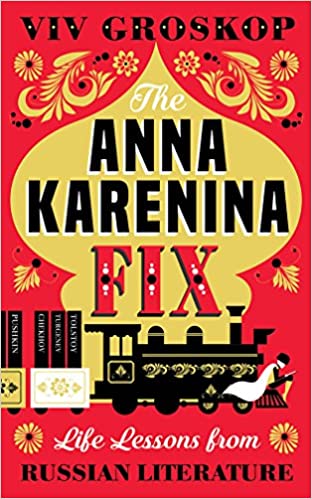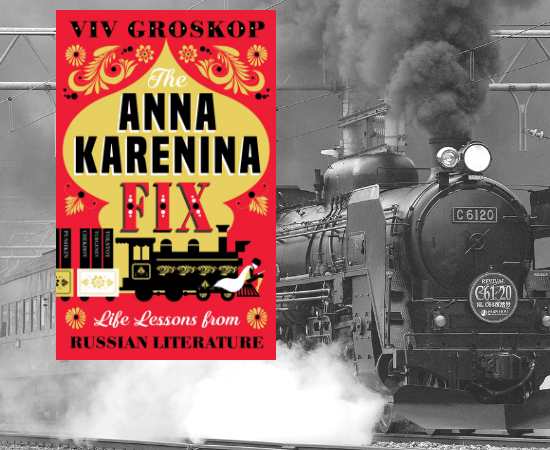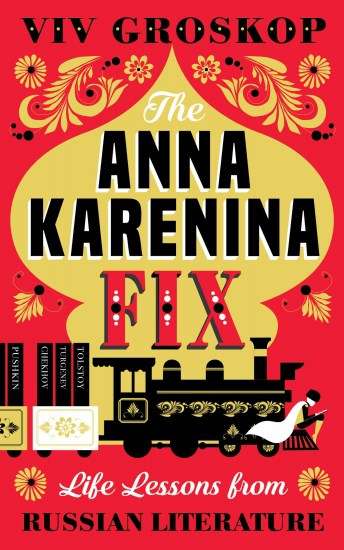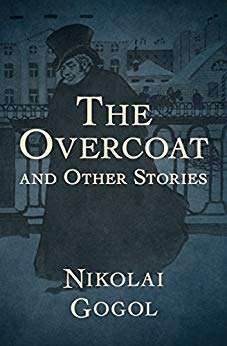The Anna Karenina Fix by Viv Groskop
Viv Groskop is widely known as a famed comedian and broadcaster. This time though, Groskop applies her sharp wit and pen to a medium entirely different from a comedy sketch or news article. Groskop has been gaining deserved acclaim from Spectator, The Times, and Observer for her new book, The Anna Karenina Fix: Life Lessons from Russian Literature (Abrams). In this tale, she discusses the pearls of wisdom she has gleaned from a territory many shy away from: the ill-rumored dense thickets of Russian literature. While the mere mention of names like Tolstoy or Chekhov may strike fear into the hearts of numerous readers, Groskop is here to say that the rumors of the inaccessibility of Russian literature are just that, rumors.
With expert precision, Groskop illustrates though her self-help memoir how Russian classics have themes everyone can connect to, and aren’t as difficult as people make them out to be. Unrequited love, discontent with the life you’re living, all of these feelings we tackle in everyday life can be found in the pages of these Russian writers. Groskop uses anecdotes from her own life as well as comparisons to pop culture icons to reveal these supposedly stuffy classics for the wealth of humor and apparent presence they still hold in our own society.
![]()
BookTrib: In The Anna Karenina Fix, you bring together Russian tragedies and comedy. How did you manage to do this?
Viv Groskop: The line between tragedy and comedy is really blurred in Russian literature—and in Russian life—and that mix is very rich and entertaining. The book is an analysis of eleven great Russian classics, some famous, some (to non-Russian readers) less well-known. I wanted to get across some of the black Russian humour I encountered when I lived in Saint Petersburg in the 1990s.
BT: You wear many hats as a journalist, author, cultural critic, and comedian. How have these experiences impacted your writing?
VG: To me, all the things I do are basically the same: I’m putting words out there that I hope are going to explain, reveal, connect, amuse, or just perk up somebody who is having a rather rough day.
BT: In your book, you bring classic literature into a modern setting with real-life comparisons the current reader could easily understand. Did you run into difficulties doing that?
VG: If anything, the opposite. People very easily grasp the idea that Tolstoy is like Oprah Winfrey with a beard. It’s so obvious when you read anything he has written. This myth has grown up that Tolstoy is incredibly complex. But in fact, he came out with many messages that were very similar to what you might read in O, The Oprah Magazine (my favorite), or in a book about mindfulness: “Take each moment as it comes.” “Always put family first.” “When you eat a salty potato, really savour it.” (I’m paraphrasing slightly but this is all in the section about the peasant Platon Karatayev in War and Peace.) Tolstoy was also into clean eating, veganism, and avoiding carbs long before anyone else discovered mashed avocado. He was essentially a very productive hipster.
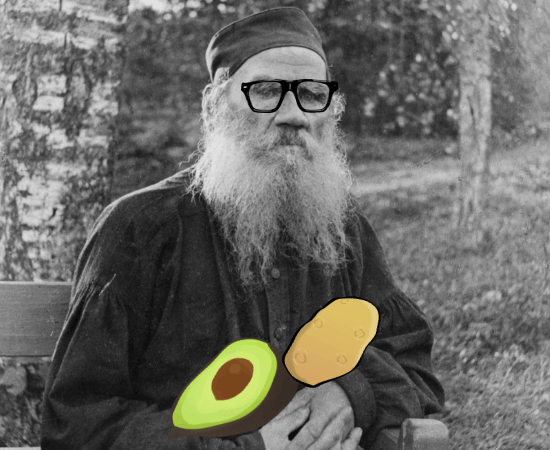
BT: What advice would you give to readers who do not typically choose Russian literature and may feel intimidated reading about it?
VG: Don’t believe the hype. People have been put off reading the Russian classics for years because the books are often seen as academic, intellectual, and stuffy. Plus, in 2018 the current political climate doesn’t exactly help. But it’s important to discover these books to see how many of the dilemmas of human life are universal and perennial. There is no need to be intimidated. I have a whole section in the book on how to navigate all the weird names and how to ignore annoying people who bicker about “good” translations. (If someone spent ten years on a translation, really, how bad can it be?)
BT: What first attracted you to Russian literature?
VG: Growing up in the 1970s with no access to the internet, I had no information about the surname Groskop and no one in my family could tell me anything about it. From a young age, I thought it sounded Russian (or, rather, I wanted it to sound Russian because that seemed glamorous and I really liked “Wind of Change” by Scorpions). As a teenager I found a copy of Anna Karenina in a charity book shop and decided that all the unpronounceable names in it were like the names of “my people.” I immediately felt an affinity toward this literature. Of course, now I know what is obvious to anyone who has access to a genealogy website: my name is not Russian at all but Jewish. In Yiddish it means, appropriately enough, “fathead.” D’oh!
BT: Which Russian classic do you find most relatable and why?
VG: If you are prone to, as I am, anxiety and fatalism, then it has to be Gogol’s The Overcoat. An insignificant copy clerk spends a long time saving up to buy an overcoat. He saves up for a ridiculously long time. On the day that he eventually buys the overcoat it is stolen from him. Shortly afterward he falls ill and dies. That is Russian literature’s idea of a life lesson.
BT: Many comedians have become quite popular authors in the last decade, writing on topics that they are passionate about. How do you think your book adds to this vibrant category of writers?
My dream and mission on earth—or possibly my gigantic delusion—is to show that there is plenty of humor to be found in (a) Russian literature; (b) the discussion of Russian literature; and (c) all accounts of Tolstoy’s insane fascination for egg dishes (favorite: eggs and brussel sprouts). In the age of Instagram and Twitter, I want to show that this stuff is for everyone. We all think that what we’re living through is uniquely modern and special, but these authors show that human beings have been occupied with the same questions for decades, if not centuries. What do you do if you love someone but they don’t love you back? See Rakitin in Turgenev’s A Month in the Country. How do you rid yourself of #FOMO? See Chekhov’s Three Sisters on the perils of comparing yourself constantly to others. How do you cope with trolling? Tolstoy received a noose in a box through the post. It’s comforting to know there’s not much that’s new out there.
BT: What is one question that you always wish people would ask you and why?
VG: “What are Russians really like?” I’m not Russian so I can only say what I’ve observed from living there, speaking Russian, and working for Vogue Russia for ten years. I’d like for people to think more about how dangerous it is to be distracted by the (predominantly negative) contemporary narrative about the culture of another country. Everything we “know” about Russia at the moment is the 21st century equivalent of a James Bond film. That is not the real Russia any more than Trump is the real America or Brexit is the real Britain. These authors are the real deal. The awareness of that legacy is really valuable in a divisive climate. It makes me feel hugely optimistic that this book has sold to Russia and will be out there in translation soon.
BT: What is one element you want to make sure readers take away from the book?
VG: Fun can be had in the most unlikely places.
The Anna Karenina Fix: Life Lessons from Russian Literature is now available to purchase.
Buy this Book!
Amazon